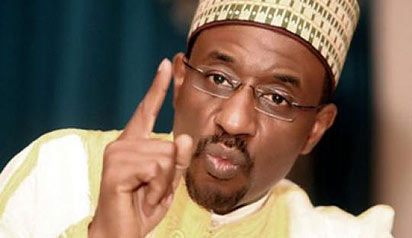Cover Story
Nigeria spends 80 percent of its earning on public office holders – Sanusi

Nigeria spends 80 percent of its earning on public office holders – Sanusi
UCHE AKOLISA
The former governor of Central Bank of Nigeria (CBN) and the Emir of Kano, Sanusi Lamido Sanusi, has blamed the state of the nation’s economy on the governance structure in the country where 80% of the country’s revenue is spent by about 1million public office holders, saying such a structure would not allow for the freeing-up of resources for the much needed development of the country.
Emir Sanusi, who spoke at the inaugural lecture on the endowment of the Oba Sikiru Adetona Professorial Chair on Governance at the Olabisi Onabanjo University, held in Lagos, recently, therefore called for a restructuring of the government system in line with Nigeria’s level of development and available resources.
“If you are a poor country, you do not need 36 governors, 36 deputy governors, each with commissioners, each with Special Advisers, a President, Vice President, 36 ministers, special assistants, bicameral federal legislature and so on. Simple Arithmetic would tell you that if you have that kind of structure, you are doomed to spending 80 to 90% of everything you earn maintaining public offices. It is really common sense but it seems to be a problem for us to understand it.
“I do remember as Governor of Central Bank when I raised this issue about 80 of government revenue is being used to maintain 1million public officers, leaving 20% for 170m Nigerians. My own government came out and disowned that statement and said that they were planning to recruit more people. The situation we are in was not unforeseen. Let us go back to basic common sense and tailor our government system to our level of development and resources,” admonished Sanusi who was one of the discussants at the lecture.
Delivering the lecture titled, “Issues and Challenges of Governance in Nigeria,” the guest lecturer, Prof Akin Mabogunje, identified the windfall from oil revenue and military regime which, he noted bequeathed on Nigeria, an ‘awoof ‘society (where money not worked for or earned is spent),as being responsible for the distortions in the governance system and development of the country.
“Because of the windfall from oil revenue and its own operational structure of a unified command, the military regime transformed this country away from the Federal and democratic trajectory of development to where we are today.
“Secondly, since the end of the military regime, it is regrettable that our political leaders and various professional groups, particularly, the Nigeria Bar Association have failed the nation in not legally challenging some of the undemocratic distortions of our governance especially at the local level.”
Mabogunje argued that “unless we seriously revisit these distortions and rectify them appropriately, the nation will continue to be hostage to a dysfunctional and disempowering governance system in the country.”
In his remark, the Oba Sikuru Adetona, while lamenting the great harm done the polity by military incursion, oil windfall and corruption, expressed hope that It is my fervent hope that the discourse, research and innovative thinking that the Professorial Chair would stimulate will help the next generation lift Nigeria out of its seemingly intractable problems.
“It is therefore my belief that for a lasting solution to these teeming problems, the youth must actively participate and be positively engaged in bringing about good governance; starting now,” he added.


